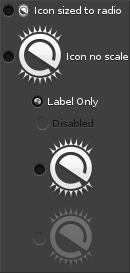Radio¶

Widget description¶
Radio is a widget that allows for one or more options to be displayed and have the user choose only one of them.
A radio object contains an indicator, an optional Label and an optional icon object. While it’s possible to have a group of only one radio they, are normally used in groups of two or more.
Radio objects are grouped in a slightly different, compared to other UI
toolkits. There is no separate group name/id to remember or manage. The
members represent the group, there are the group. To make a group, use
Radio.group_add() and pass existing radio object and the new radio
object.
The radio object(s) will select from one of a set of integer values, so
any value they are configuring needs to be mapped to a set of integers.
To configure what value that radio object represents, use
state_value to set the integer it represents. The
value of the whole group (which one is currently selected) is
represented by the property value on any group member. For
convenience the radio objects are also able to directly set an
integer(int) to the value that is selected.
Emitted signals¶
changed- This is called whenever the user changes the state of one ofthe radio objects within the group of radio objects that work together.
Layout text parts¶
default- Label of the radio
Layout content parts¶
icon- An icon of the radio
Inheritance diagram¶

- class efl.elementary.Radio(Object parent, *args, **kwargs)¶
Bases:
efl.elementary.__init__.LayoutClassThis is the class that actually implements the widget.
- Parameters
parent (
efl.evas.Object) – The parent object**kwargs – All the remaining keyword arguments are interpreted as properties of the instance
- callback_changed_add(func, *args, **kwargs)¶
This is called whenever the user changes the state of one of the radio objects within the group of radio objects that work together.
- callback_changed_del(func)¶
- group_add(group)¶
Add this radio to a group of other radio objects
Radio objects work in groups. Each member should have a different integer value assigned. In order to have them work as a group, they need to know about each other. This adds the given radio object to the group of which the group object indicated is a member.
- Parameters
group (
Radio) – Any object whose group the object is to join.
- selected_object_get()¶
- state_value¶
The integer value that this radio object represents
- Type
int
- state_value_get()¶
- state_value_set(value)¶
- value¶
The value of the radio group.
This reflects the value of the radio group and will also set the value if pointed to, to the value supplied, but will not call any callbacks.
- Type
int
- value_get()¶
- value_pointer_set(value)¶
- Set a convenience pointer to a integer to change when radio group
value changes.
This function DO NOTHING in python !! DO NOT USE !!
Deprecated since version 1.8: Don’t use this, only works in C.
- value_set(value)¶
